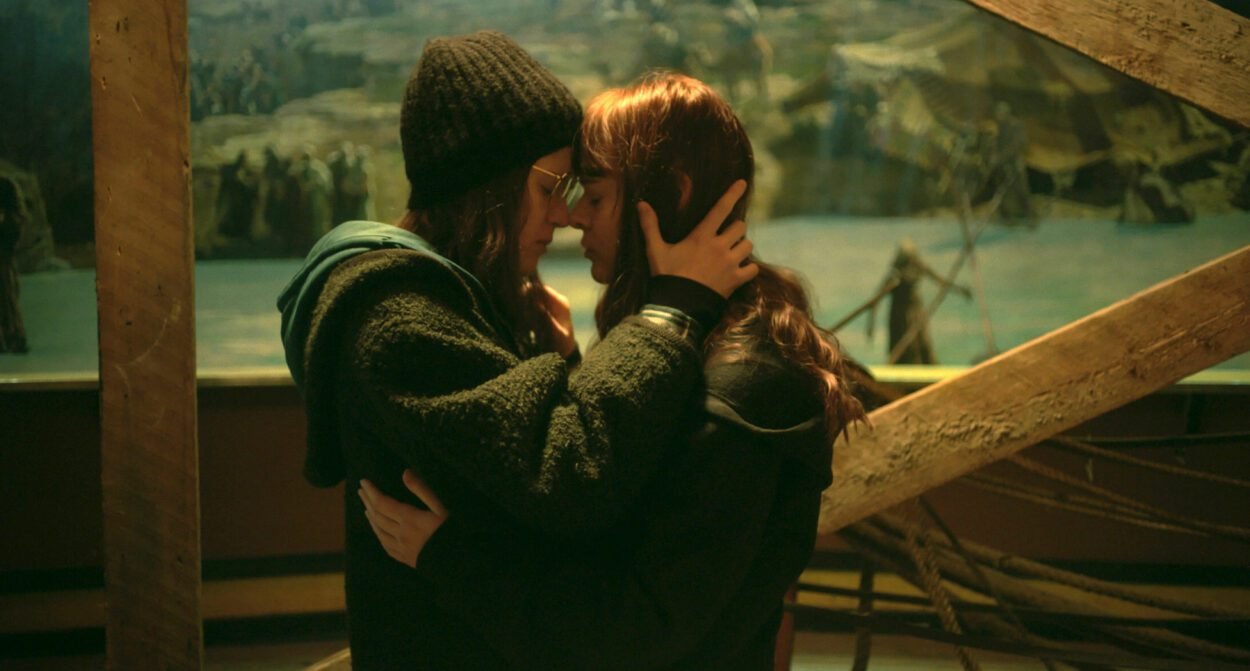“You Can Live Forever” - Film Review
This review was originally posted on Film Obsessive.
Teenage longing is a specific desire. It’s fleeting, all-encompassing, and like a gut-punch to the stomach, even if it all goes well. To capture that youthful yearning is something of a magic trick. When done right in a film, it forcefully yanks the audience member back in time to when they were young and falling in love for the first time. For queer kids coming of age, a first crush is far more layered. Not only are there all the emotions of a crush, but there’s a deep sense of trepidation. An awkward, cautious dance trying to figure out if they’re alone in their feelings and if the object of their affection could be queer too. As distinct as teenage yearning is, there’s something rapturous when it comes to a queer first crush. Miraculously, You Can Live Forever captures these feelings with authenticity, desire, and heartache.
Jaime (Anwen O’Driscoll) moves to a small town in Quebec after her father passes away because her mother is still grieving and feels like she can’t properly look after Jaime. Jaime’s aunt (Liane Balaban) and uncle (Antoine Yared) welcome her with open arms. The small town they live in is primarily made up of Jehovah’s Witnesses. While Jaime’s aunt and uncle are devout believers, Jaime is not. As part of the condition of living under their roof, Jaime must attend the weekly meetings. It’s at one of these meetings that Jaime first catches a glimpse of Marike (June Laporte), the daughter of the congregation’s leader (Tim Campbell). What begins as a simple friendship between Jaime and Marike slowly develops into something more.
Photo: courtesy Good Deed Entertainment.
One of the most striking aspects of You Can Live Forever is its treatment of the Jehovah’s Witness congregation and townspeople. It would have been very easy to make the characters extraordinarily cartoonish and plainly evil. The film’s central characters are two teenage girls who are falling in love amid the strictness of Jehovah’s Witness beliefs, but the film doesn’t offer a simple “us versus them” narrative.
It’s a tricky thing to grow up around intense religious beliefs and not be a part of that world. Jaime is immensely grateful for the kindness of her aunt and uncle, but finds it cruel that the Jehovah’s Witnesses treat anyone who leaves the community as if they’re dead. Marike has never known any other way, and it’s impossible to pretend that exposure hasn’t affected her in positive and negative ways. When a person’s entire world is an insular community, learning to see and understand what’s beyond their experience takes years of effort. If they never meet anyone outside their world, they may never know there are other possibilities available to them. You Can Live Forever doesn’t support the treatment of Jaime and Marike by members of the Jehovah’s Witness congregation, but it shows how intertwined faith, family, and freedom are.
Photo: courtesy Good Deed Entertainment.
The relationship between Jaime and Marike is the film’s central story. From their first meeting to their last, You Can Live Forever throws its full weight behind their slow-burn romance. Sarah Watts and Mark Slutsky, who co-wrote and co-directed the film, really let the audience live in the build-up between Jaime and Marike. The result is one of the most honest depictions of a first crush in recent memory. Watts and Slutsky managed to capture the yearning of Portrait of a Lady on Fire and mix it with adolescent charm. It takes a particularly deft hand to be able to make a joke about the Book of Genesis and SEGA Genesis work on both comedic and envious levels. And isn’t that what it’s like to be a teenager with a crush? To be so wrapped up in feelings that every experience is heightened. Tragedy and possibility are just two sides of the same coin when you’re young and in love.
You Can Live Forever comes from a Jehovah’s Witness text titled You Can Live Forever in Paradise on Earth. It discusses one of the main tenets of the religion, which is that there is a paradise awaiting believers. After Armageddon, God will turn earth into a paradise and devout Jehovah’s Witnesses will live there forever. This belief is an interesting speed bump between Jaime and Marike. There’s a patience in Marike because she believes that time will continue to go on and on. They will find each other again, so it’s not so terrible if things are difficult now. Jaime has an underlying sense of urgency and a desire for something tangible. It’s evident in how she holds onto a gift Marike gave her and continues to wear the friendship bracelet they made together, even many years later. The film’s title also speaks to the eternity of a first love. Whether or not a first love ends in a happily-ever-after doesn’t actually matter. Those emotions and that person live on simply because of the tenacity of what once was.
After screenings at film festivals in 2022, You Can Live Forever was pirated and leaked online. To most, that’s a nightmare scenario for a film. However, Watts and Slutsky say it’s the best thing that could’ve happened to their film. The speed and fervor with which queer people all around the world discovered the pirated film speaks to the quality of the movie and the ever-present desire for well-written LGBT stories. In a sense, You Can Live Forever has entered a state of immortality even before its digital release on May 5. The film has already spurred FanFiction, video edits to Taylor Swift songs, and TikToks. You Can Live Forever is a first crush personified. Angsty, lovely, and worth reminiscing about forever.
Follow me on BlueSky, Instagram, Letterboxd, & YouTube. Check out Movies with My Dad, a new podcast recorded on the car ride home from the movies.


